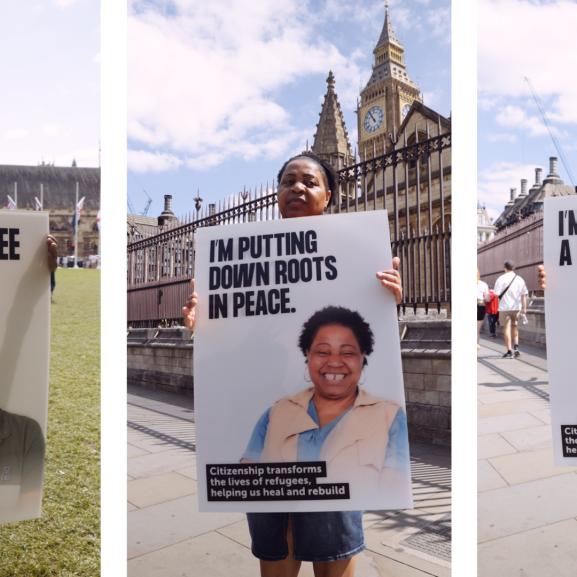New asylum rules will endanger torture victims
New government asylum rules will see torture victims removed from the country, possibly back into the hands of their torturers, simply because the new rules deny victims the time to explain their case, a leading British human rights organisation says.
The Government plans to force asylum seekers who are initially refused protection by the Home Office to leave the country before they have a chance to appeal to an independent Adjudicator. Appeals must be submitted from the country of origin or a third country certified by the Home Secretary.
The Medical Foundation for the Care of Victims of Torture says this will pose a serious threat to victims of torture who find it hard to talk about the horrors they have endured. Many of the Foundation's patients found it impossible to reveal-all when initially applying for asylum. Shame, particularly in the case of men and women who have been raped, profound humiliation that torture survivors are forced to endure, fear of officials and an unwillingness to confront the past can all account for a torture survivor omitting relevant details from their initial Home Office interview.
The Home Office accepts that in the case of torture victims, new evidence may very well be produced at the appeal stage that significantly improves the applicant's chances of asylum. At the moment an adjudicator can hear that evidence before removal. This change in the law means that torture survivors will be sent back, perhaps to be tortured again, without being heard.
A Government amendment to the Nationality, Immigration and Asylum Bill [Clause 82] at present going through parliament, will remove the possibility of "late disclosure”. New "non-suspensive appeals” are planned in which asylum seekers who fail initially will be immediately removed from Britain and forced to make an appeal either from their countries of origin, or a third country. Hitherto, removal proceedings have been suspended while an appeal has been pending.
Psychologist Olivia Ball, who has examined nearly 20 Medical Foundation cases where late disclosure was an issue said: "This is particularly hard on torture victims, who in many cases find it difficult to talk about what has happened. Trust is a major difficulty for most survivors of torture because of the nature of the abuse they suffered. Concepts such as confidentiality and privacy do not feature in some cultures, and feelings of suspicion and fear can be exacerbated by the presence of an interpreter from the same ethnic background in the room.
"In addition, it is well documented that many torture survivors will avoid recalling their experiences because the process is simply too painful. As a result, it takes time to obtain a full and accurate account of what took place.
"For these and other reasons, crucial evidence often emerges only at appeal and makes a material difference to the outcome. A refugee's right of appeal is, therefore, not a desperate second chance, but an essential, integral part of the asylum process. New information revealed at the appeal stage is not to be automatically viewed with scepticism and taken as evidence against the applicant's credibility.
"Earlier Medical Foundation research conducted by Dr Juliet Cohen suggest that memory problems may, in fact, be a sign of authenticity in torture survivors. Late disclosure is a common phenomenon that must be expected and accommodated in any safe and just asylum process.
"A non-suspensive appeal system in which the applicant is either sent home, or to a third country before they feel able to disclose the horrors they have experienced could expose an asylum seeker to grave personal danger. Such a system would also undoubtedly create a breach of the UK's obligations under Article 3 of the European Convention on Human Rights and of the Human Rights Act.”
Freedom from Torture cases researched by Ms Ball included:
1) A 45-year-old African survivor of torture who sustained multiple head injuries. He now suffers chronic pain, insomnia, memory loss and depression, all of which can impair memory. Interviewed by the IND (Immigration and Nationality Directorate of the Home Office) without legal representation, he did not disclose the fact of his detention or torture and was refused. A solicitor who was secured for his appeal recalled: "I had to spend at least three long sessions with this client in order to elicit the details of his case, the facts of which were complicated. The preparation of [his] statement took so long because of his mental state and the difficulty he had in talking about what had happened to him in detention.” He was detained on three separate occasions, but was unable to say for sure during which detention different instances of torture occurred. Such memory problems are to be expected in his circumstances. The rate of recovery from traumatic head injury is reduced for injuries incurred after the age of 40, and a "blending” or blurring of similar memories is common. The night before his case was to come before an adjudicator, the IND granted refugee status.
2. A Middle Eastern couple with two young children: he was imprisoned and tortured for eight years; she was raped at home in front of the children. Interviewed within days of their arrival in England, the couple could not bring themselves to reveal details of the torture and their application was refused. The husband said he tried to forget about what had happened to him. Referred to the Medical Foundation, the wife agreed to see a counsellor without her husband and was then able to speak about her rape. The IND questioned the applicants' credibility when the solicitor attempted to introduce this "new information.” After the family had been granted refugee status on appeal, one of the children danced around the therapist's office singing, "We are safe, we are safe. We do not need to be afraid.”
3. A South American woman in her 30s; her husband and son were "disappeared” by government agents and are presumed dead. She herself was abducted, threatened, sexually assaulted and tortured. She and her young daughter arrived in the UK and applied immediately for asylum. Refused, she appealed. She had difficulties with the interpreter at the appeal hearing, who, she claimed, did not speak Spanish very well and asked her more than one question at a time. Asked to describe her most traumatic experience, the applicant collapsed and the appeal was adjourned. Later she disclosed the extent of her torture to a doctor at the Medical Foundation, who provided a report documenting her torture and explaining why she could not speak of it until then. The Special Adjudicator accepted her refugee claim, acknowledging that minor differences in details given by the applicant in initial and subsequent accounts did not undermine her overall consistency and credibility. Rather, her inability to describe her ordeal at the appeal hearing was taken as evidence that she was "completely genuine”.
Contact: Advocacy Officer (Refugee Issues) David Rhys Jones Tel: 07956240466





